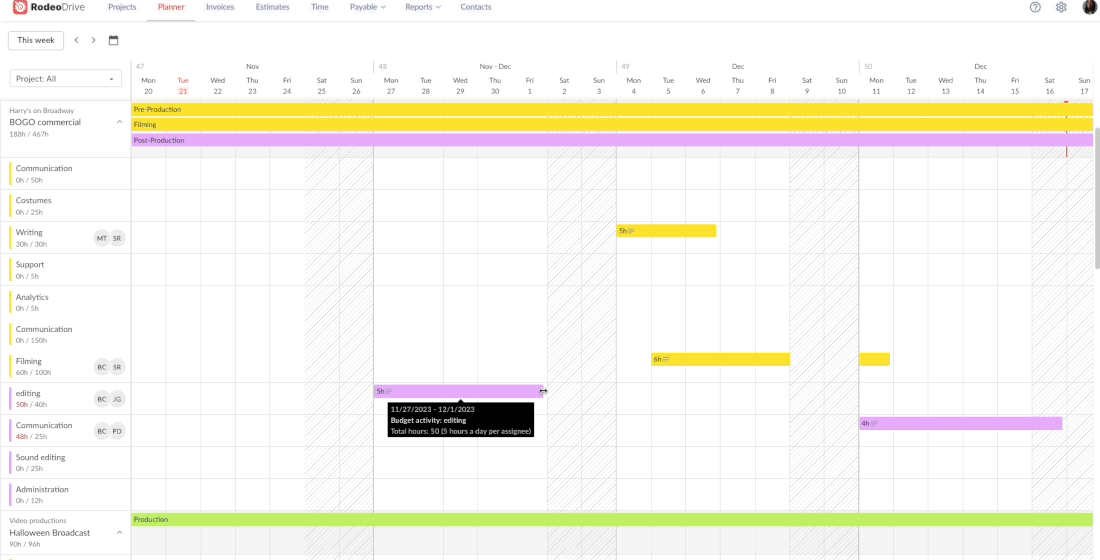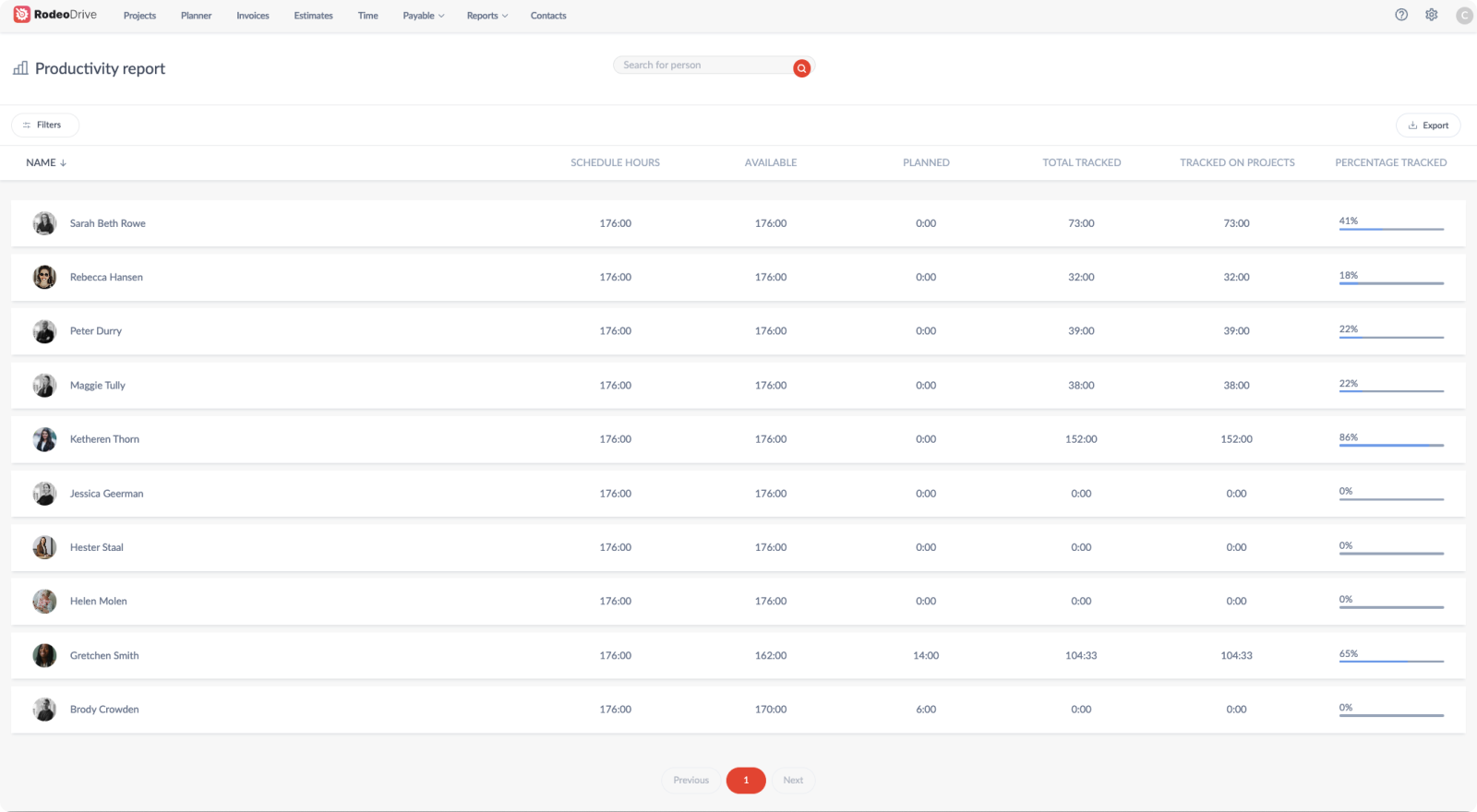Program Manager vs. Project Manager: What Sets Them Apart?
Program management and project management might sound super similar, but each plays a distinctly different role in an organization’s success.
That said, there are quite a few similarities between the positions of program manager and project manager that allow them to work together to achieve organizational goals efficiently.
For instance, programs are comprised of multiple projects that contribute to an organization’s long-term strategic objectives, whereas individual projects are short-term endeavors that set out to produce specific tangible deliverables. Without projects, it would be difficult to make progress toward your organization’s larger goals.
In this blog, we’ll set the record straight on the difference between program and project managers, the skills and responsibilities required of each, and how to determine which role your team needs to be successful.
What’s the difference between projects and programs?
A program is a collection of projects and initiatives coordinated together to achieve strategic objectives. Programs are often ongoing and are designed to achieve broader, long-term goals. Programs also tend to come with a lot of dependencies as well.
On the other hand, projects are characterized by their temporary nature and resource limitations, such as time or budget constraints. Project outputs are typically tangible, as deliverables often serve as a physical representation of the project team’s accomplishments.
Project success is often measured by the quality of the project deliverables, whether the team stayed within the prescribed budget and timeline, and if the client is satisfied with the end result.
This measure of success is different from programs, the success of which is measured according to whether the program met the organization’s needs and provided the appropriate benefits. This is a much more abstract way of determining success.
Another key difference between programs and projects is their level of complexity. Projects are usually smaller than programs and experience less complexity, whereas programs are larger undertakings that require the management of relationships between departments. As a result, programs involve more uncertainty.
Related: Strategic Planning: What it is & How to Improve it
Program vs. project example
The difference between projects and programs might still be tricky to wrap your mind. To make it more concrete, imagine that your company has decided to redesign its onboarding program to improve employee retention and satisfaction.
As part of revamping this program, you’ll need to develop new content to include, design the materials — including graphic design and video production — and implement a new software platform to deliver the onboarding materials to your new hire. Each of these endeavors can be considered its own project that contributes to the larger, ongoing initiative of a redesigned onboarding program.
So, as you can see, the program is the unifying strategic objective, and various projects all play a role in the program’s ultimate success.
What does a program manager do?
The program manager is responsible for executing organizational strategies and coordinating progress toward program goals. This includes overseeing the dependent projects and other initiatives that comprise the overall program.
For instance, program managers must be skilled in deciding which projects will have an impact on the program’s goals to determine which projects are worth pursuing. Program management is very high-level and requires the ability to make decisions that contribute to long-term strategic plans.
Once these decisions have been made, the program manager is also responsible for tracking progress toward these goals and making adjustments as necessary. After a new strategy has been implemented, the program manager needs to carefully measure ROI, for example.
Program manager vs. project manager
The program and project manager roles are extremely interconnected, as project managers facilitate the execution of program managers’ strategies via individual projects.
Whereas program managers oversee the coordination of several projects at once, the day-to-day execution of projects is left up to the project manager to supervise.
Project managers ensure that the project team’s daily tasks and activities are being completed on time and that the entire project is progressing as expected. The success of individual projects then contributes to the program manager’s larger goals.
So, not only do these two positions work alongside each other toward a shared vision, but project managers often report to their program counterparts.
Related: Project Management Office: What It Is and Why It's Important
How do the responsibilities of project and program managers differ?
Since both program and project managers oversee the facilitation of projects to varying degrees, it can be difficult to understand their responsibility differences.
That said, there are some pretty clear differences between them. For instance, projects come with specific start and end dates, whereas programs tend to be ongoing without a clear beginning or end.
Below, we’ll delve deeper into the main differences between the two.
Program manager responsibilities
Because the program manager position is a leadership role, it requires the ability to coordinate with several teams at once and facilitate communication with stakeholders. However, these are just two of the many responsibilities that fall on the program manager’s plate.
Overall, you’ll find that these responsibilities tend to be much more strategy-focused than the responsibilities of project managers. Examples of program manager duties include:
- Identifying what initiatives your organization needs to be successful.
- Building a program budget and maintaining the right levels of spending.
- Integrating the objectives of several different projects into a unified strategy.
- Assessing and mitigating risks that may impact your program’s success.
- Regularly monitoring program progress to evaluate success.
Project manager responsibilities
While the project manager position is also a leadership role, it requires individuals to manage and oversee their team on a more granular level. Here is a preview of the project manager is responsibilities:
- Devising a project plan that includes objectives, scope, timelines, and resource requirements.
- Narrowly defining a project’s scope to ensure that it stays within predefined boundaries without veering off course.
- Allocating resources like time, budget, and materials in a way that allows your team to successfully produce deliverables.
- Communicate with team members, stakeholders, and clients successfully through emails and meetings.
- Implement a quality control process to ensure that project deliverables meet the required standards and specifications.
- Regularly track project data and other reporting metrics to keep the project on course.
What skills do program managers need?
Because program managers work at a high level, it can be difficult to conceptualize the types of skills you’ll need for success in the role.
This is especially true when you compare the must-have skills for program managers to the skills required for project management, which largely revolve around managing smaller, day-to-day tasks. At the same time, there’s still overlap between the two positions.
Let’s take a look:
Strategic thinking
Strategic thinking is a critical skill for program managers because the programs they set forth need to be aligned with the organization’s overall strategy. Without this sort of alignment, it’s impossible for program managers to spearhead initiatives that create a meaningful and lasting impact on their organization.

Change management
A lot of the work that program managers do involves significant organizational change. This is just one reason why program managers need to be experienced in navigating change management.
Additionally, nearly every project experiences some level of change — whether those are scope changes or unexpected bumps in the road. Either way, program managers are nearly guaranteed to encounter changes when overseeing several projects at one time.
Strong leadership
The program manager role requires a lot of collaboration, and strong leadership is needed to see that collaboration through. With numerous project teams underneath a single program, the program manager must inspire their teams, keep everyone aligned on their objectives, and resolve conflicts that arise to ensure successful cross-functional collaboration.
Communication
Anyone who’s worked on a project before knows the importance of good communication. This is often why many project managers create a project communication plan to outline what effective communication will look like in practice.
The same level of commitment to communication is necessary for program managers as well. A lot of their job consists of monitoring progress, and it’s important that they’re skilled in communicating those updates to stakeholders.
.png)
Stakeholder management
While program managers certainly have relationships with several project managers to tend to, they also have relationships with executive leaders and other external partners to manage as well. Building and maintaining these critical stakeholder relationships is a big part of effective leadership.
Types of program management certifications
Perhaps you feel as though you have many of the necessary skills to become a program manager. But how can you make employers feel confident in your abilities?
Just as project manager certifications can help assure employers that you have the right skills needed for the job, program manager certifications serve the same purpose. They can also be a great stepping stone to a promotion or new position.
And because many program manager positions are high-level and sometimes senior roles that have a large impact on the organization’s direction, employers might care a lot about your professional certifications. Here’s a look at two main types to know about:
Program Management Professional (PgMP)
The Program Management Professional (PgMP) certification is offered by the Project Management Institute to certify your advanced experience and skills that contribute to successful program management. This can pave the way for career advancement opportunities.
This is not an entry-level certification. Instead, the prerequisites require several years of program or project management experience, as well as a degree. The Project Management Institute requires those seeking the PgMP certification to complete a panel review, a 170-question certification exam, and the completion of 60 professional development units every three years.
Managing Successful Programmes (MSP)
Managing Successful Programmes, also known as MSP, is a certification that helps program managers learn how to manage complexity and resources, along with aligning projects and programs with organizational strategies.
Individuals seeking this certification have the option of attending a training course before taking the exam or self-studying before testing. This makes it a more approachable certification for program managers with less experience.
Additionally, the MSP is split into two levels: MSP Foundation, which provides the framework’s fundamentals, and MSP Practitioner, which builds on the foundation by providing students with the analytical tools to think more strategically.
Common challenges faced by program managers
Just like any position, the role of program manager isn’t always an easy one. Add on the fact that the program manager is a unique position that facilitates progress toward the executive team’s goals, and it isn’t difficult to see why this role often experiences challenges.
Here are a few common challenges that anyone looking to go into program management should be aware of:
- Long-term program timelines can be difficult to wrangle, especially when they’re dependent on the outcomes of short-term projects.
- Overseeing multiple cross-functional projects at once can pose challenges, such as unaligned goals and miscommunication on strategic objectives.
- Unless the program manager maintains the right level of oversight over their projects, it’s easy to get left out of the loop on status updates.
- Accessing reliable data that allows program managers to stay up to date on the progress of their various project teams can be challenging.
How to determine which role is right for your team’s needs
Many organizations conflate programs and projects, which can result in less-than-ideal outcomes.
If you’re not sure which role your organization should prioritize, the following three questions can help you identify the best course of action.
1. What areas is your organization struggling in?
A lot of executive teams have big ideas for their organization but fall short of executing them. This is usually because it’s unclear how these ambitious objectives can be split up into smaller, more achievable goals that are actually manageable for your team.
If your organization is struggling to meet these high-level strategic objectives, then poor program management might be to blame. But, if your team is unable to produce the deliverables that are expected of them, then you’ll want to invest in the project manager role.
2. What types of outputs does your organization need most for success?
If a lot of your organizational failures tend to happen on a task or deliverable level, then a project manager can help solve this issue.
For example, if your team consistently fails to produce client deliverables when they’re expected to, then a project manager can help them better manage their day-to-day tasks to prevent things from slipping through the cracks.
3. What’s working? What’s not?
Because a lot of organizations end up putting program manager responsibilities on the project manager’s plate, your team might not be reaching its full potential. Consider how the way that your team is currently structured might be helping or harming your organization’s capacity for success.
And if these three questions don’t clear things up, it’s possible that your organization needs to invest in both of these positions rather than prioritizing one over the other. After all, they’re not the same thing, and both play important roles in an organization’s development and success.
Related: How to Find and Adopt a Successful Marketing Team Structure
Manage your programs and projects with Rodeo Drive
We’ve already discussed how accessing reliable data to track project progress is one of the key challenges that program managers face. But how do program managers find a way to keep tabs on progress?
The answer is with the help of a project management tool, such as Rodeo Drive. Platforms like Rodeo Drive allow project teams to build budgets, track their time, and plan project activities all in one place.

Having all of your project data centralized in a single place makes it easy to keep tabs on progress. Rodeo Drive eases the progress tracking process by offering automatically generated reports on metrics like project profitability, time registration, and employee productivity.

Plus, with different team roles, Rodeo Drive allows you to customize the information available to each team member. This means you can add program managers to your Rodeo Drive workspace so that they have access to the project information that’s relevant to their tracking processes.
The best part is that you can try Rodeo Drive completely free today. You don’t even have to enter a credit card. What’ve you got to lose?








